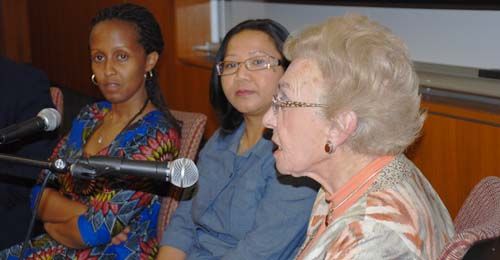Women Survivors Discuss Prevention and Forgiveness After Genocide

Celina Biniaz, Edith Umugiraneza and Sara Pol-Lim shared their stories of survival and resilience at the last Genocide Awareness Month event at USC on Tuesday, “Women of the Holocaust, Cambodia and Rwanda: Three Survivors in Conversation.” The event was hosted by the Shoah Foundation Institute Student Association (SFISA).
Biniaz was the youngest female (13 years old) on “Schindler’s list”– Jewish workers protected by German industrialist Oskar Schindler at his factory during the Holocaust. Pol-Lim was in a children’s concentration camp and lost most of her family in the Khmer Rouge Killing Fields in Cambodia in the late 1970s. Umugiraneza also lost most of her family in the Rwandan Tutsi Genocide in 1994. All three women moved to the United States after their ordeals, raised families and continue to educate others about genocide and tolerance.
The panel discussion was introduced by Syuzanna Petrosyan, a third-generation descendant of Armenian Genocide survivors and master’s candidate in public diplomacy at USC. Stephen Smith, USC Shoah Foundation executive director, facilitated the discussion.
To begin the panel, Smith asked each panelist what remembrance means to her.
Biniaz pointed out that not only Jews died in the Holocaust. Five million others who didn’t fit Hitler’s ideal of “what a person should be like” were also killed. For her, it’s very important to let young people know the importance of fighting bigotry and accepting people for who or what they are. “Hate is corrosive to the person who hates,” she said.
“For me, remembrance means prevention,” Umugiraneza said. “It’s my own way to honor my own people, the ones I lost.”
Smith asked the panelists to reflect on their experiences as mothers and how genocide has influenced how they have raised their children.
All three stressed the importance of not allowing their past to affect their children’s happiness. Pol-Lim said she felt it was her responsibility to make sure her children grow up to be considerate of humankind, and Umugiraneza said she feels her children have to know what happened, although at times it’s difficult to know how to talk to them about it. Biniaz said she first told her children about her experiences in the Holocaust when they were 14 and 11 years old, but wanted them to form their own opinions about it and not hate anyone.
The conversation then turned to the concept of forgiveness and if it is possible. All the women said that forgiveness is necessary in order for survivors to move on with their lives. Biniaz said “you have to work for it; it doesn’t come naturally,” and Umugiraneza compared refusing to forgive to being in a prison of sorts; she can’t help others if she is not free. But Madudu Uwamariya, USC Shoah Foundation staff, said that to her, “forgiveness” sounds like you give the person who wronged you “a kiss on the cheek and then have a beer together,” which she isn’t necessarily comfortable with.
“You do not forget, but you educate people so it doesn’t happen again. You ask yourself ‘Can I continue living with these people and continue moving forward?’” Biniaz said. “Otherwise you’re always stuck in a trap and you’ll always feel resentful.”
Pol-Lim said she has found closure in coming together with her community – especially the 50,000-strong community of Cambodian survivors living in Los Angeles.
The next question came from a writer from Religio Magazine, who asked what we can do to break down cultural and religious barriers between people that can lead to genocide. Umugiraneza noted that she left her Catholic faith after the genocide because so many people were massacred in churches, where they had thought they would be safe. Pol-Lim said forums just like this are very important for facilitating awareness.
Biniaz said we have to watch out for people being marginalized or put into categories, since it’s “much easier to do away with them” if they are considered “Others” or not part of the community. But she said she loves young people today, who are generally more accepting and wouldn’t be as likely to do this.
In response to a question about how they managed to go on even in the face of such atrocities during the genocide, Pol-Lim and Biniaz both talked about their mothers, who inspired them to make the most of life.
As the evening drew to a close, one student asked what it was like for Pol-Lim, Umugiraneza and Biniaz to speak on the panel together. Biniaz said she felt a kinship among them because they all understand the fear and loss each has experienced.
“It’s the first time I’ve met you but we share something,” Biniaz said.
“It gives me hope,” Umugiraneza added.